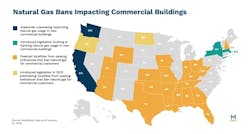Despite recent setbacks, advocates of leveraging grassroots legislative power to get further down the road to an all-electric future continue fighting back, securing some gains in the process.
Bold efforts to move some communities away from natural gas in favor of electric were dealt a blow in April, further complicating the national picture of where gas bans – and efforts to block them – stand (see Figure below). A United States Appeals Court ruling effectively shot down municipal gas bans of various types that were starting to go viral in the wake of a sweeping one passed in Berkeley, Calif., in 2019.
That was rescinded after the 19th Circuit agreed with a challenge lodged by the California Restaurant Association, one motivated by fears of the law forcing restaurateurs to abandon gas stoves.
From California to Colorado to New York, similar bans that had been passed were put on hold. Others face lawsuits similar to the restaurant association action that successfully asserted Berkeley’s action banning gas hookups in new buildings effectively established appliance energy efficiency standards, which are reserved for the federal government under the Energy Policy and Conservation Act.
But despite the chilling effect of the Berkeley ruling, some state and local jurisdictions are persevering, getting creative in how they craft legislation that starts the process of phasing out gas in favor of electric. Strategies include regulation of potentially dangerous chemicals produced in gas cooking, like nitrous oxides; carbon taxes on buildings; renegotiation of franchises with gas utilities that make it harder to install new gas lines; adoption of policies that reward and encourage building electrification; and market transformation initiatives that favor steady transition to non-gas appliances, most notably electric heat pumps that can potentially replace or complement gas furnaces.
Other efforts are being couched in legislation permitting limited experimentation with prioritizing electric infrastructure over gas. One worth watching may be Massachusetts’s Municipal Fossil Fuel Free Demonstration Program that is kicking into high gear in 2024.
Created in a comprehensive climate and clean energy law in 2022, the program allows up to 10 cities to enact legislation limiting fossil fuel infrastructure in furtherance of experimentation with greener construction. Each will have leeway to create their own standards and rules – including exceptions for restaurants reliant on gas stoves for example – but most will likely be centered around prohibiting gas hookups in new construction or major renovations. That will have the effect of ensuring that many new or substantially new buildings will be mostly or all electric. That would make only a small dent in the municipal infrastructure but serve as a real-world test for substituting electric for gas and a model for possible statewide expansion.
Some of the participating cities were stymied in efforts to enact gas bans prior to the demonstration program’s adoption. One, Lexington, passed a bylaw in 2021 restricting new fossil fuel infrastructure but ran afoul of Massachusetts law forbidding stricter standards without state approval. Another, Brookline, was one of the first East Coast communities to attempt a gas ban, in 2019. It was disallowed, leading the city, along with others, to try the home rule petition avenue. None were successful initially, but interest didn’t wane. Their desires to be at the forefront of change were instrumental in the creation of the demonstration program.
Yet all has not gone the way of the state’s electrification advocates in 2024. Proposals to prevent the state’s Department of Public Utilities from letting gas utilities extend service to cities in the state not now served by gas and to give the state’s Energy Facility Siting Board the power to halt approval of large gas infrastructure projects were scrapped in negotiations over a new state climate bill, one that ultimately failed to pass the state legislature. That has left a sour taste in the state’s electrification advocates but advanced the interest of opponents who see gaping holes in wholesale efforts to move away from gas, among them potentially higher construction costs, electricity generation’s reliance on fossil fuels and soaring residential electrical infrastructure costs for homeowners who might be forced to substitute or specify electric appliances for gas models.
About the Author
Tom Zind
Freelance Writer
Zind is a freelance writer based in Lee’s Summit, Mo. He can be reached at [email protected].

